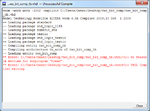RoldGold
Newbie level 3
Trouble with ModelSim, trying to use "std_logic_textio" synopsys "hread" procedure
I'm trying to use the hread procedure from std_logic_textio.vhd from synopsys in ModelSim and I'm running into some trouble. Currently my vhdl testbench throws an error during compilation saying: "Unknown identifier "hread".
Here's what I have done:
1. I've added std_logic_textio.vhd to the Project in ModelSim from C:\modeltech_6.5c\vhdl_src\synopsys
2. Added library work; and use work.all; to VHDL testbench header (I think this is necessary?)
3. have a .do file that does:
project compileoutofdate
vcom -refresh
vsim -novopt work.tb_name -t 1ps
do Waveform.do
and then get an error: "Unknown identifier "hread"" ....... when doing this: hread(my_file, my_slv_v);
Anyone have any ideas as to what the problem might be? I'm quite stuck.
I'm trying to use the hread procedure from std_logic_textio.vhd from synopsys in ModelSim and I'm running into some trouble. Currently my vhdl testbench throws an error during compilation saying: "Unknown identifier "hread".
Here's what I have done:
1. I've added std_logic_textio.vhd to the Project in ModelSim from C:\modeltech_6.5c\vhdl_src\synopsys
2. Added library work; and use work.all; to VHDL testbench header (I think this is necessary?)
3. have a .do file that does:
project compileoutofdate
vcom -refresh
vsim -novopt work.tb_name -t 1ps
do Waveform.do
and then get an error: "Unknown identifier "hread"" ....... when doing this: hread(my_file, my_slv_v);
Anyone have any ideas as to what the problem might be? I'm quite stuck.
